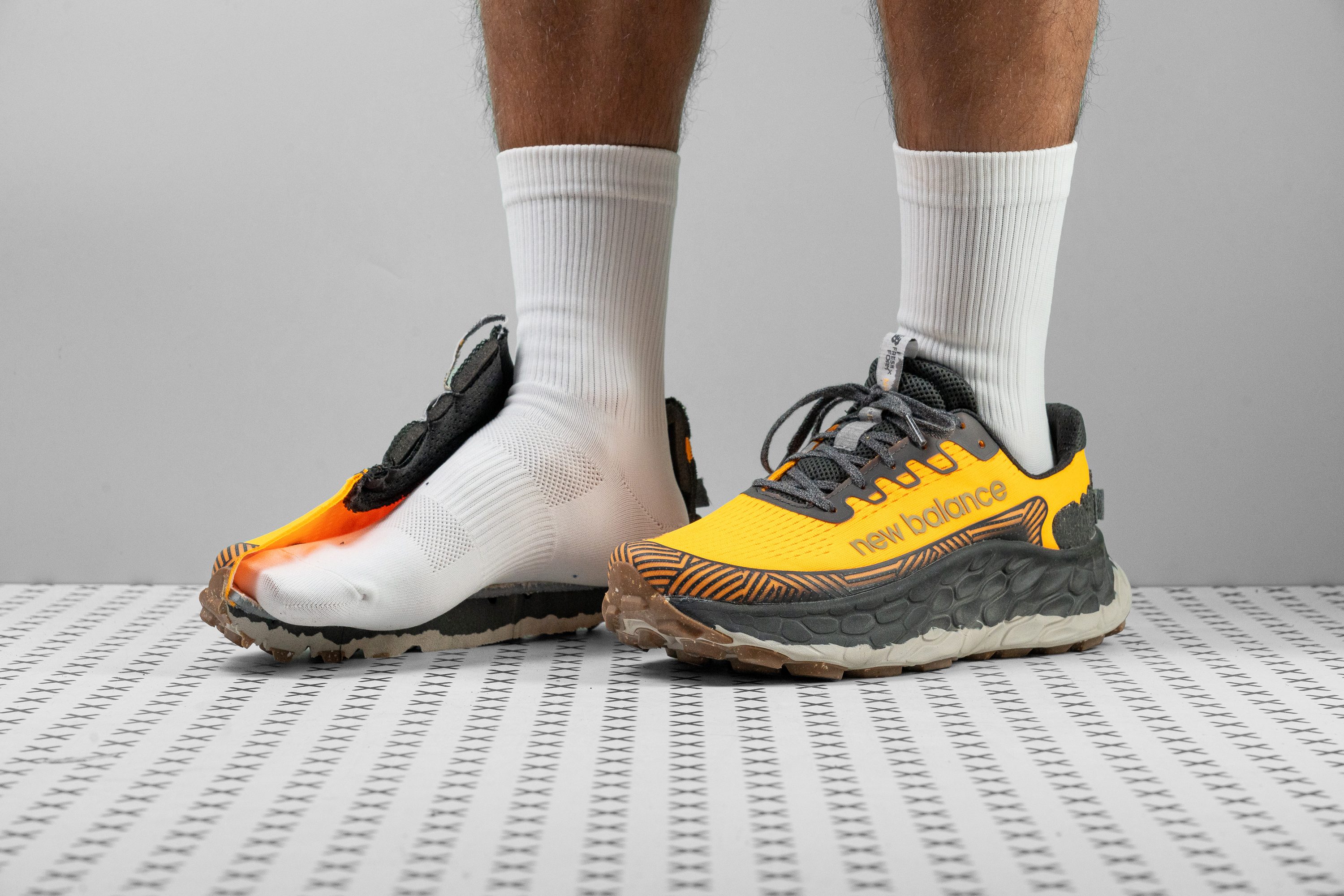Our verdict
- Top pick in best New Balance trail running shoes
Pros
- Insanely protective even without a rock plate
- Soft cushioning without feeling mushy
- Solid amount of bounce
- Incredibly stable
- Plush and airy upper
- Good grip on mild to moderate trails
- Durable outsole
- Light on the run
- Really smooth ride
- Best for easy days and long runs
- Sustainable
Cons
- Upper could use more support
- Not great for technical trails
- Pointy toebox
Audience verdict
- Top 8% most popular running shoes
Comparison
The most similar running shoes compared
+ + Add a shoe | |||||
|---|---|---|---|---|---|
| Audience score | 87 Great! | 81 Good! | 88 Great! | 85 Good! | |
| Price | $160 | $85 | $185 | $170 | |
| Trail terrain | ModerateTechnical | Light | ModerateTechnical | LightModerate | |
| Shock absorption | High | Moderate | Moderate | Moderate | |
| Energy return | Moderate | Low | Moderate | Moderate | |
| Arch support | Neutral | Neutral | Neutral | Neutral | |
| Weight lab Weight brand | 10.6 oz / 301g 10.6 oz / 301g | 10.3 oz / 292g 10.4 oz / 296g | 10.3 oz / 293g 10.4 oz / 295g | 12.1 oz / 342g 12.9 oz / 365g | |
| Drop lab Drop brand | 7.1 mm 4.0 mm | 10.1 mm 8.0 mm | 7.2 mm 4.0 mm | 7.0 mm 5.0 mm | |
| Strike pattern | Mid/forefoot | Heel | Mid/forefoot | Mid/forefoot | |
| Size | True to size | True to size | True to size | True to size | |
| Midsole softness | Soft | Balanced | Soft | Soft | |
| Difference in midsole softness in cold | Normal | Normal | Normal | Big | |
| Toebox durability | Very bad | Very bad | Good | Very bad | |
| Heel padding durability | Decent | Bad | Good | Bad | |
| Outsole durability | - | Decent | Good | Decent | |
| Breathability | Moderate | Moderate | Moderate | Moderate | |
| Width / fit | Medium | Medium | Medium | Medium | |
| Toebox width | Narrow | Medium | Narrow | Medium | |
| Stiffness | Moderate | Flexible | Moderate | Stiff | |
| Torsional rigidity | Moderate | Stiff | Stiff | Stiff | |
| Heel counter stiffness | Moderate | Stiff | Flexible | Stiff | |
| Lug depth | 5.0 mm | 4.0 mm | 3.9 mm | 3.0 mm | |
| Heel stack lab Heel stack brand | 38.6 mm 39.4 mm | 37.7 mm 36.0 mm | 38.0 mm 33.0 mm | 40.0 mm 42.0 mm | |
| Forefoot lab Forefoot brand | 31.5 mm 35.4 mm | 27.6 mm 28.0 mm | 30.8 mm 29.0 mm | 33.0 mm 37.0 mm | |
| Widths available | NormalWide | Normal | Normal | Normal | |
| For heavy runners | ✗ | ✓ | ✗ | ✗ | |
| Season | All seasons | All seasons | All seasons | All seasons | |
| Removable insole | ✓ | ✓ | ✓ | ✓ | |
| Orthotic friendly | ✓ | ✓ | ✓ | ✓ | |
| Ranking | #163 Top 43% | #312 Bottom 18% | #138 Top 37% | #220 Bottom 42% | |
| Popularity | #30 Top 8% | #232 Bottom 39% | #119 Top 32% | #105 Top 28% |
Cushioning
Shock absorption
If your top priority in a running shoe is impact absorption, the More Trail v3 is the one to grab. We found 158 SA in the heel and 128 SA in the forefoot—both firmly in the upper tier, making this shoe feel like a full-on mattress underfoot.
And while that might sound like sacrilege to trail purists who crave ground feel, it’s refreshing to have comfort-loaded alternatives so every runner can find their favorite fit.
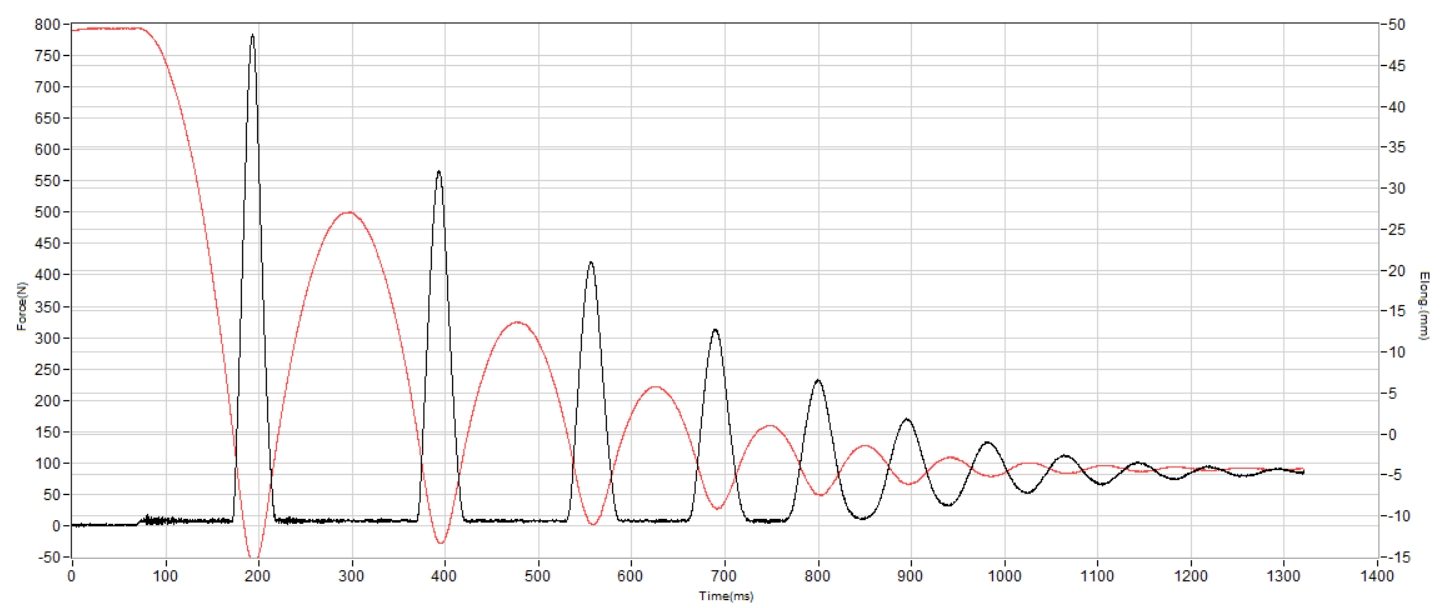
| Fresh Foam X More Trail v3 | 158 SA |
| Average | 122 SA |
Energy return
We expected energy return to be lower than 58.4% in the heel and 61.8% in the forefoot based on our runs—and that highlights why lab testing matters so much to us. Relying on feel alone is incredibly subjective and can vary from day to day.
| Fresh Foam X More Trail v3 | 58.4% |
| Average | 55.3% |
Size and fit
Size
New Balance Fresh Foam X More Trail v3 fits true to size (80 votes).
Internal length
| Fresh Foam X More Trail v3 | 264.0 mm |
| Average | 269.0 mm |
Width / Fit
We created a custom gel mold to accurately measure the toebox and discovered that the More Trail v3 offers a mostly average fit, though it comes with a few notable quirks.
First, the widest part of the toebox measured 94.7 mm—slightly narrower than most trail shoes—making it more suitable for runners with low-volume feet.
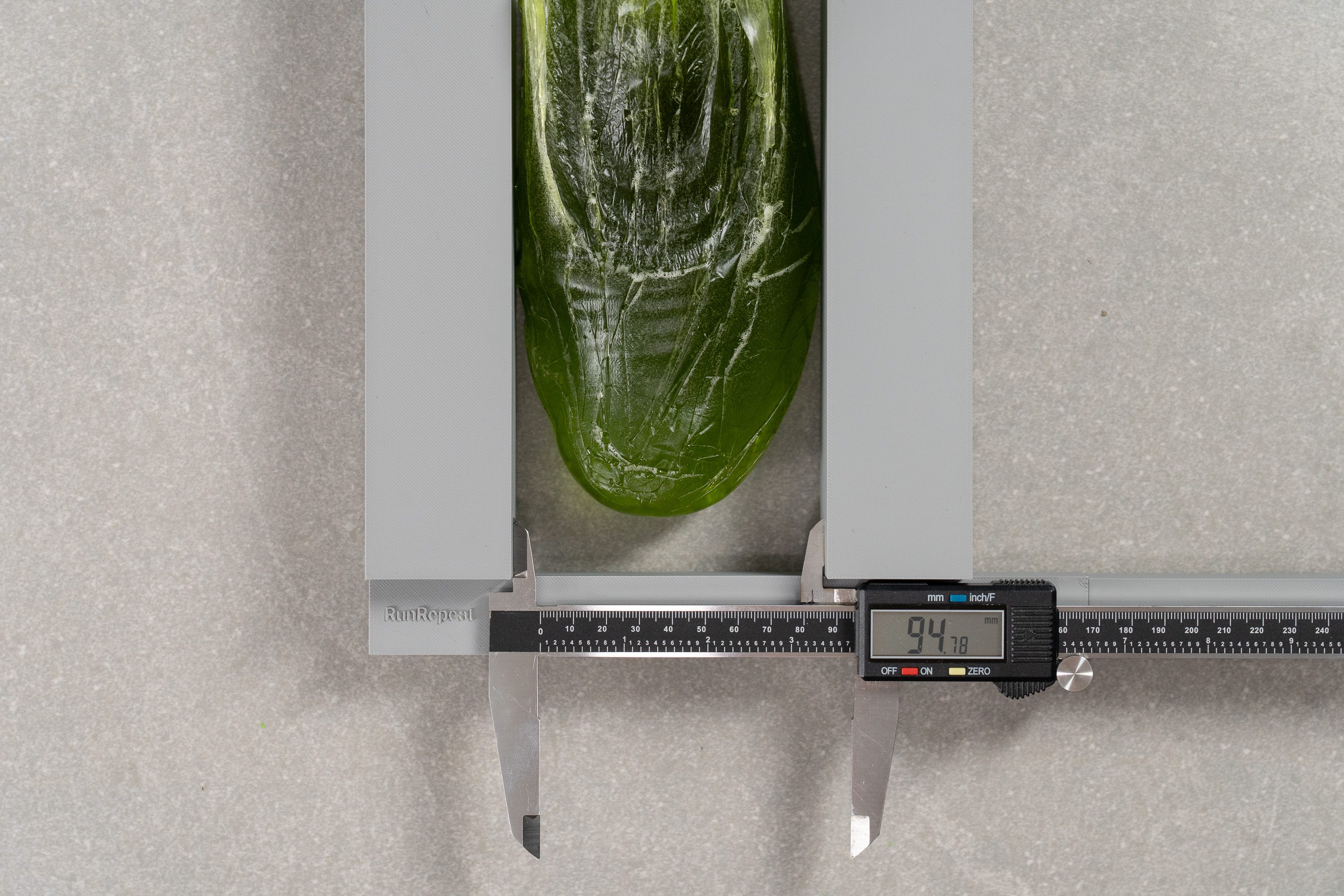
| Fresh Foam X More Trail v3 | 94.8 mm |
| Average | 95.6 mm |
Toebox width
Next, the big toe area registered a surprisingly narrow 70.7 mm.
This aggressively tapered design significantly limits toe splay, ruling out wide-footed runners despite the shoe's overall size.
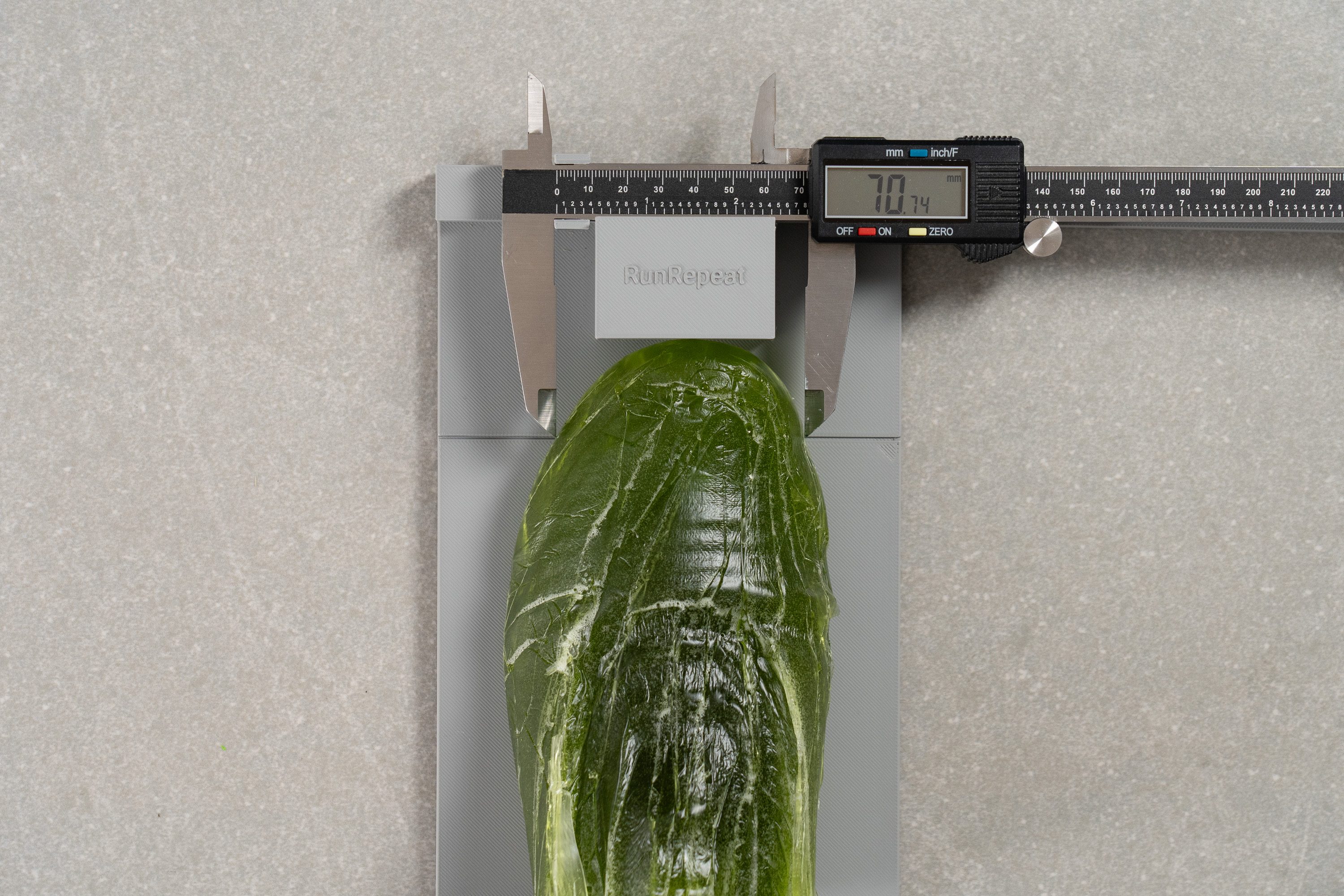
| Fresh Foam X More Trail v3 | 70.7 mm |
| Average | 74.6 mm |
Toebox height
Lastly, we used calipers to assess the vertical space, recording 27.2 mm. While this measurement is average and should work for most runners, the reinforced upper reduces stretch.
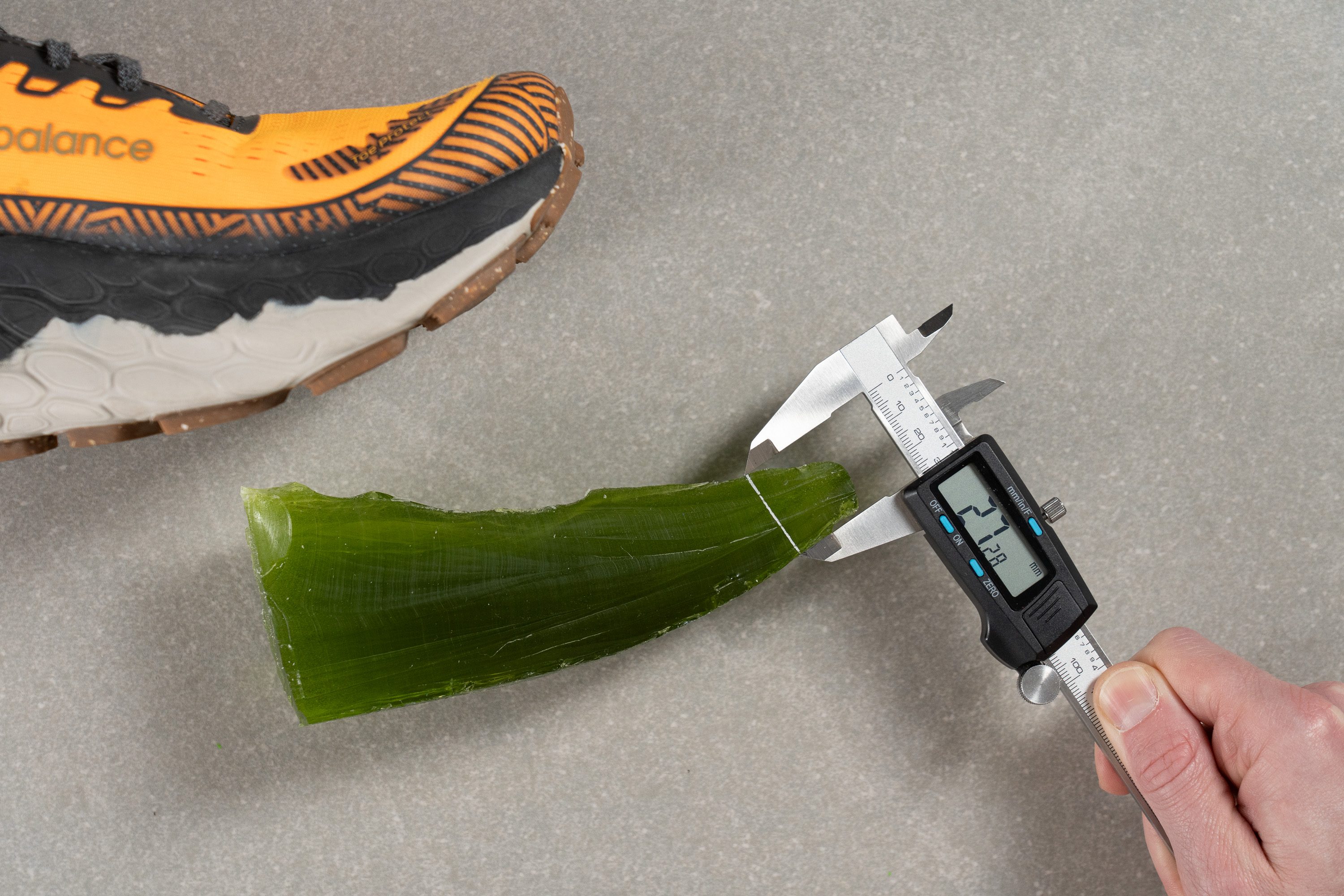
| Fresh Foam X More Trail v3 | 27.3 mm |
| Average | 27.0 mm |
Flexibility / Stiffness
Despite its monstrous stack height, the More Trail v3 proved to be sufficiently flexible in the forefoot. Our lab test showed that it takes a regular amount of force (14.4N) to bend this NB shoe by 30 degrees.
| Fresh Foam X More Trail v3 | 14.4N |
| Average | 14.6N |
Who should buy the More Trail v3
We suggest getting the NB Fresh Foam X More Trail v3 if you:
- Want a maximal runner for cruising on the trails.
- Need a shoe that will protect your feet and legs on ultra-distance trail runs.
- Are looking for a highly cushioned yet stable trail trainer.
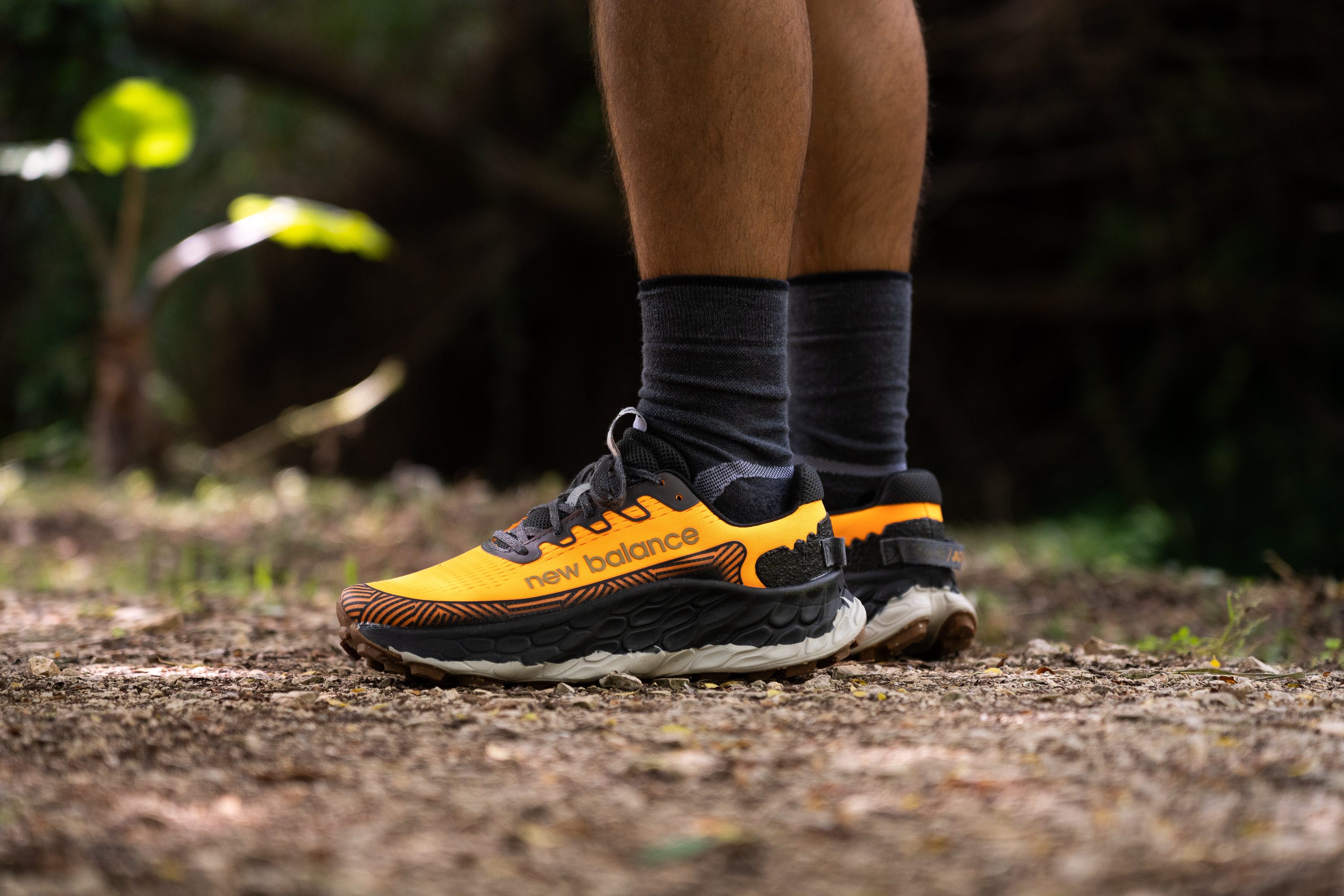
Who should not buy it
If you’re looking for a more technical-ready trail runner, we recommend checking out the Hoka Speedgoat 5. For a shoe with a more substantial upper, try the New Balance FFX Hierro v7.
Upper's playing rookie-league
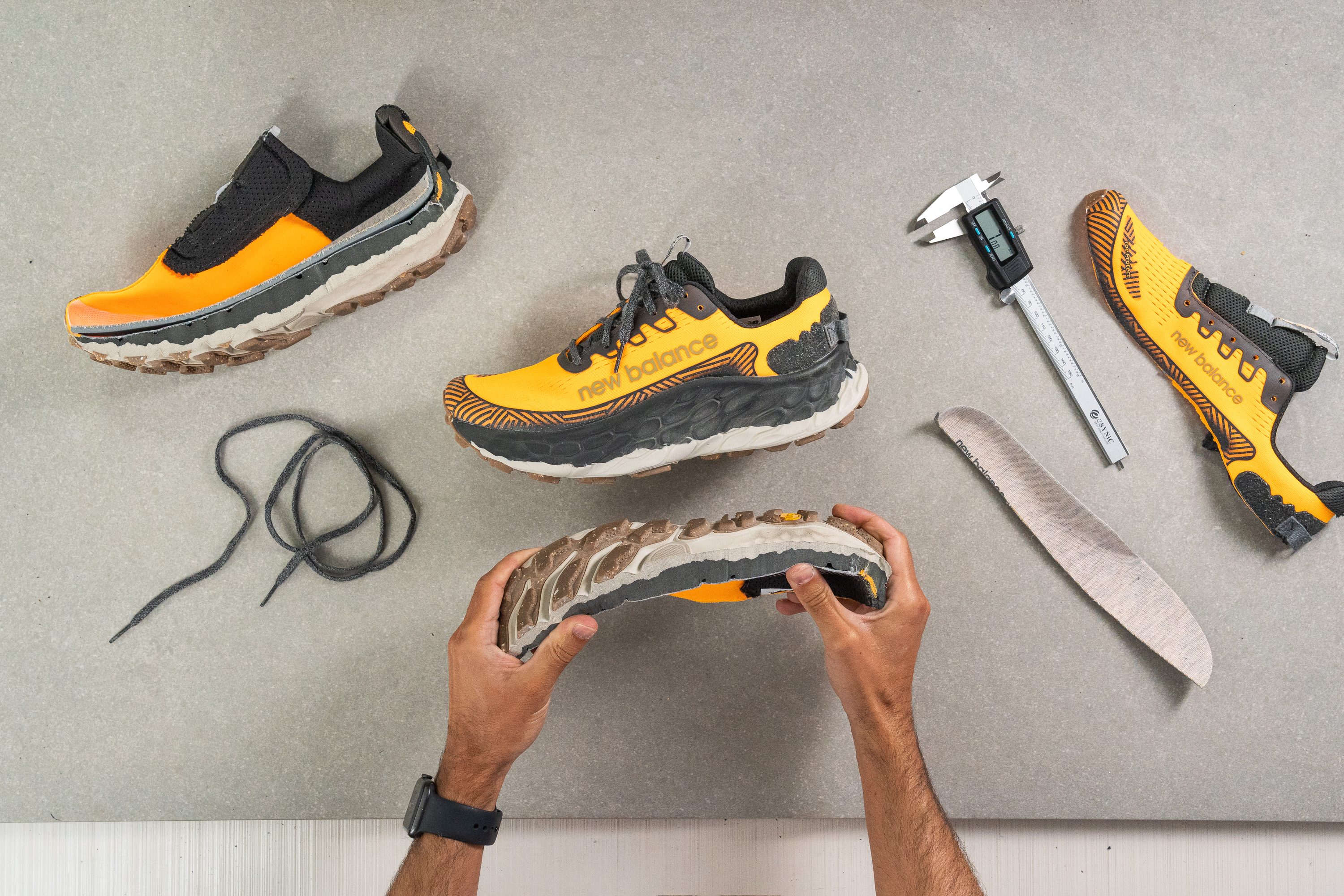
One of the few faults we found in the More Trail v3 is with its upper. Given the shoe's high stack, we expected a more supportive fit. What we got instead was a light, stretchy, and airy mesh with some overlays that—while comfortable—did not sufficiently provide the support we needed.
Assessing the shoe's breathability, we rated it as 3 out of 5. That's considered average amount of ventilation for a trail shoe.
When the light illuminates the upper, it reveals numerous ventilation holes and a thin mesh that effectively facilitates ample airflow.
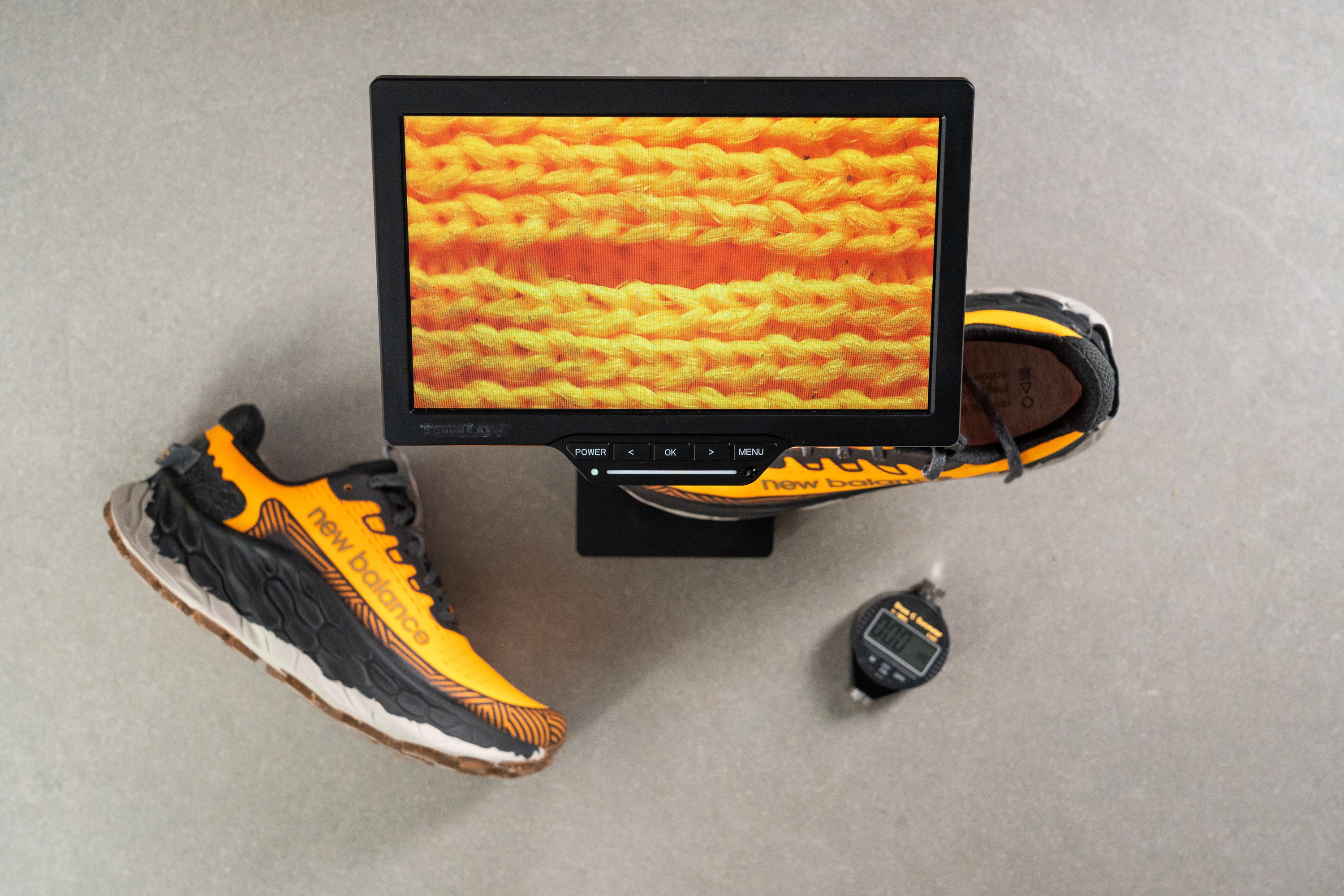
However, there's nothing quite like the trusty old microscope to reveal the intricacies of those ventilation holes.
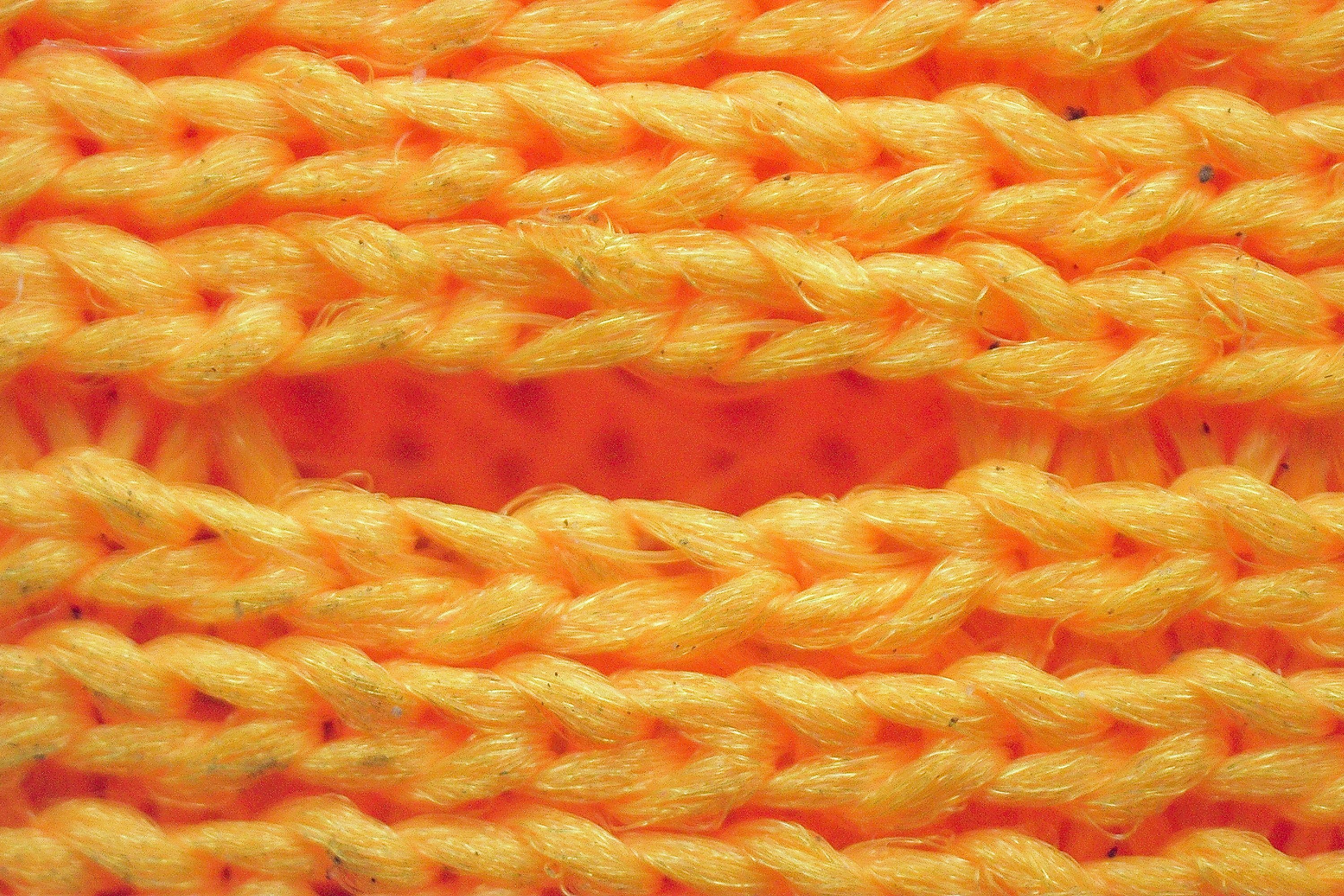
As you can observe in this jaw-dropping image, they are not large, and beneath them, a thin fabric provides additional protection for your feet but also works against ventilation. That's why this shoe achieved a run-of-the-mill 3/5 score.
"A-" Durability
New Balance embarked on a mission to reduce the weight of this shoe given its massive stack height. One of the strategies employed was utilizing a less rugged upper.
During our Dremel test, where we apply the same force to every shoe for 4 seconds, the More Trail v3 exhibits almost no resistance!
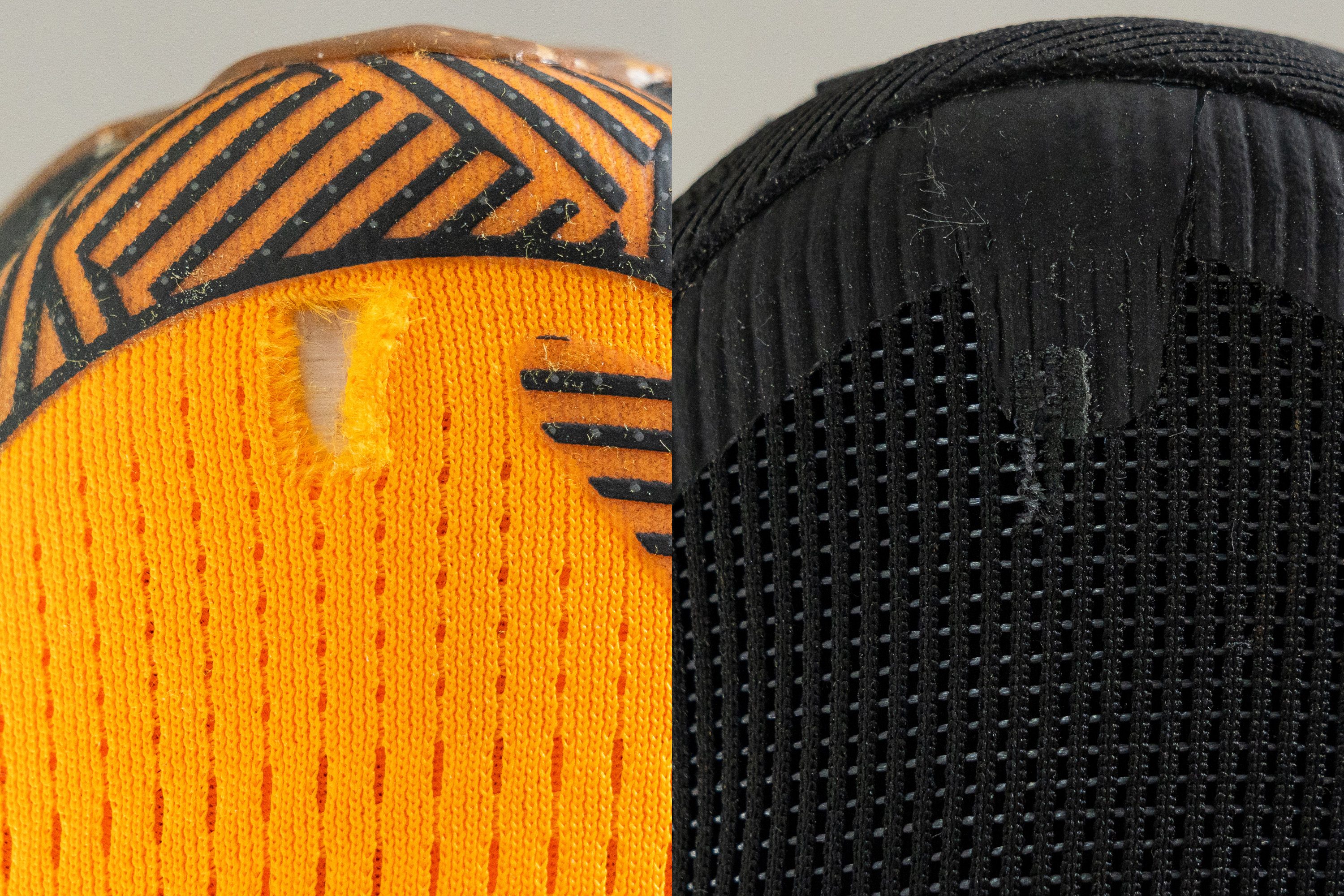
As you can see, the Nike shoe fared significantly better in the same test, displaying superior resistance.
While it is true that the shoe has reinforcements in key areas, try to avoid any damage in the unprotected regions.
On the flip side, the heel appears to be sufficiently durable to withstand sock abrasion throughout the shoe's lifespan.
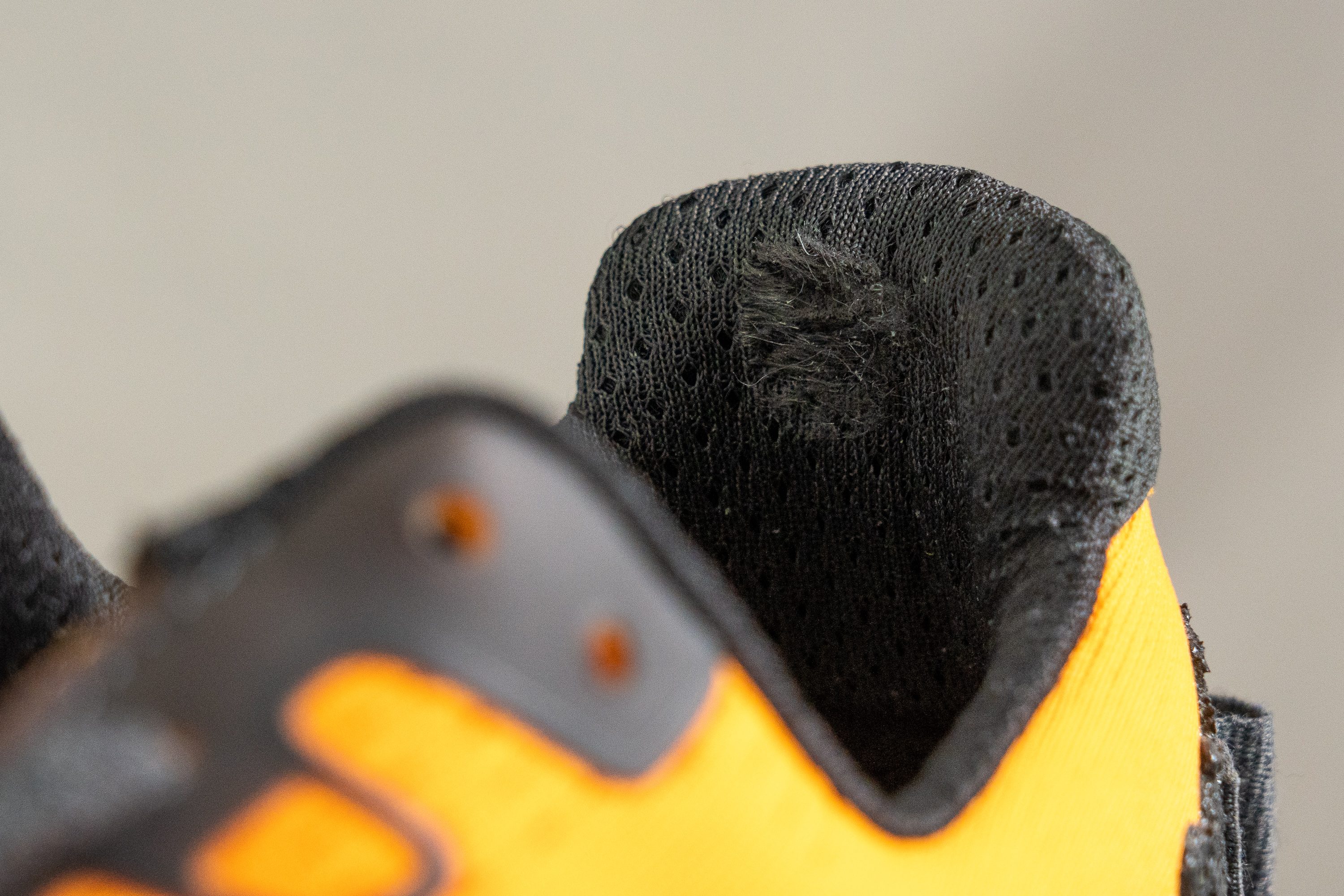
Height is might
In the trail shoe realm, there aren’t many models that could challenge the More Trail v3’s stack.
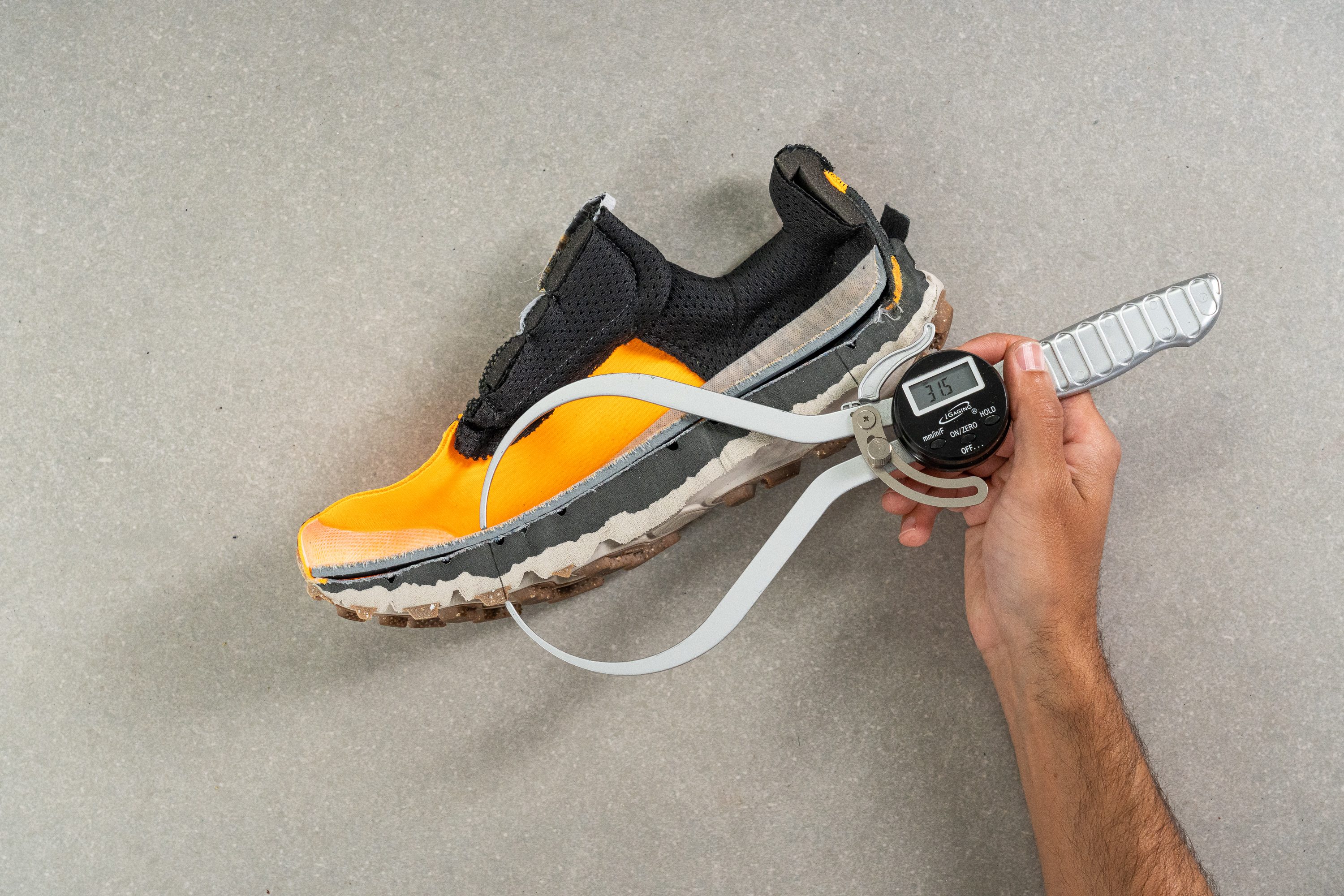
According to New Balance, this shoe boasts a stack height of 39.4/35.4 mm, resulting in a 4-mm heel-to-toe drop. However, our measurements differ, indicating a stack height of 38.6/31.5 mm, yielding a higher-than-stated 7.1-mm drop—still a skyscraper-high stack, sure!
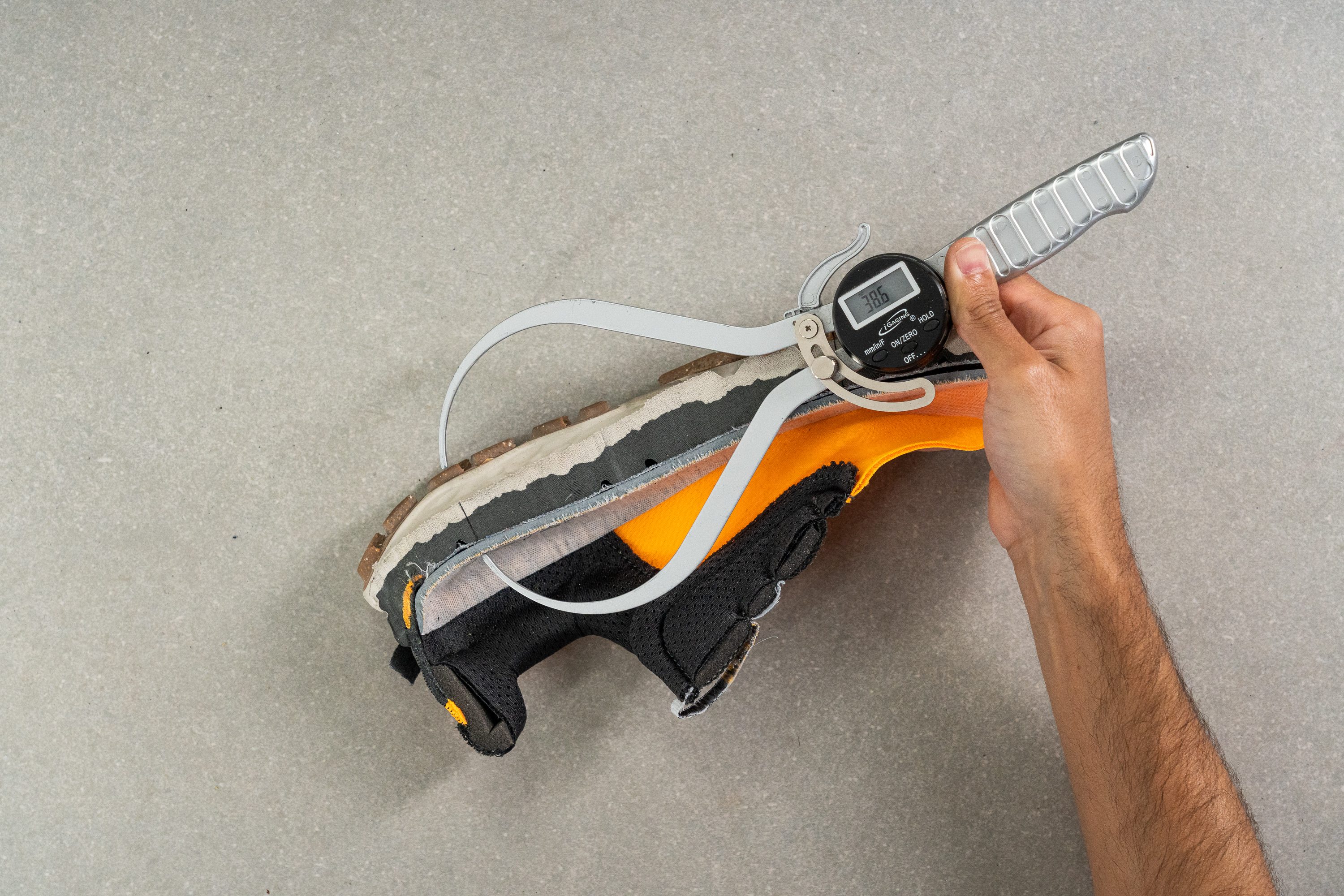
Its thick layer of dual-density Fresh Foam X gives the shoe a great deal of comfort and protection. Thanks to his setup, we got a super plush underfoot experience all while remaining fully protected from rocks and debris.
Additionally, even when compared to other soft, high-stacked FFX shoes, we found that the v3 was adequately bouncy and didn't feel too soft for it to be tagged as easy-run-only.
Based on our lab measurements, this trail shoe impressively ranks among the top 5% softest trail shoes, registering a buttery-soft 14.9 HA. That's 85% plusher than trail shoes on average!
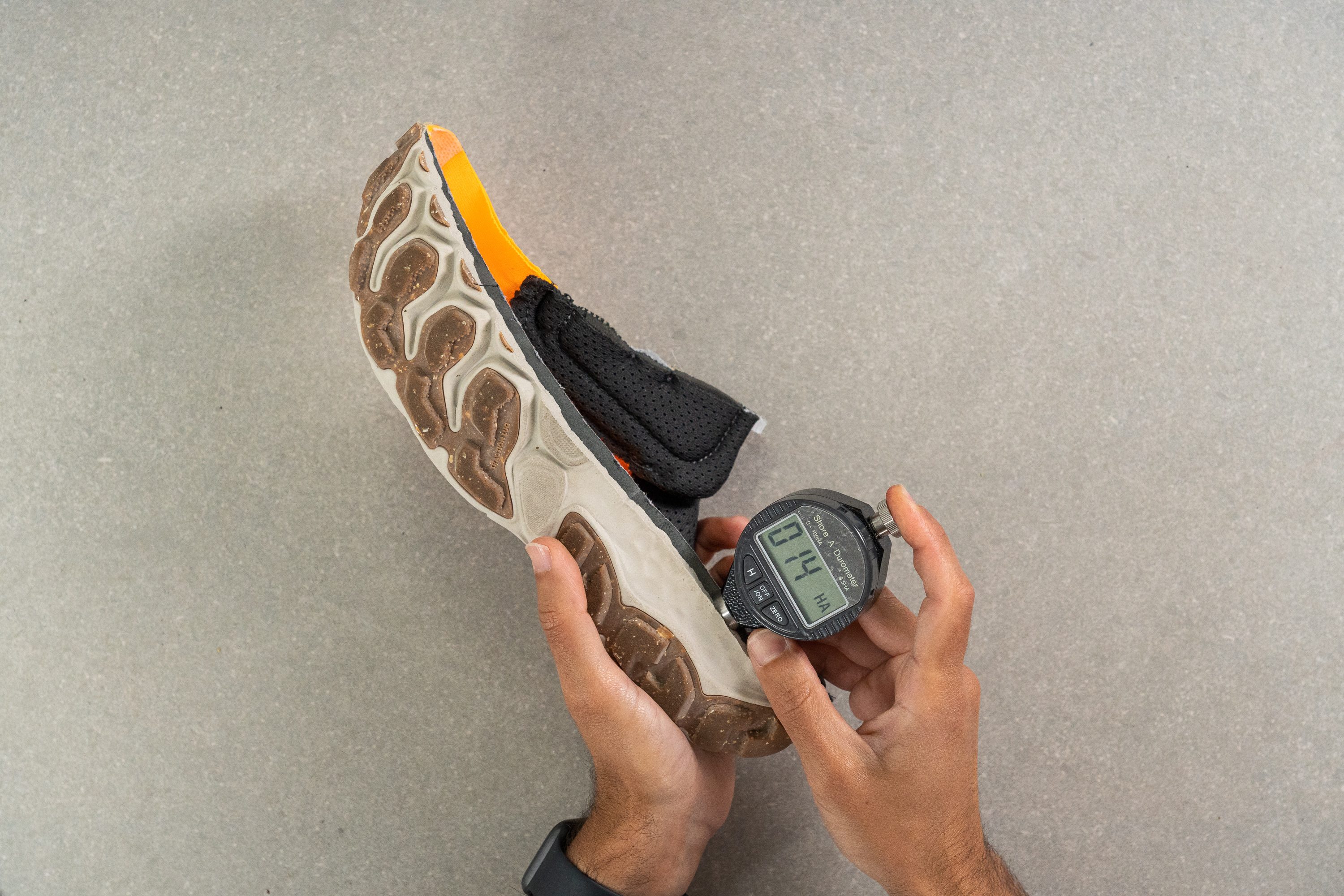
Chillingly good in winter
One of the major criticisms regarding New Balance's Fresh Foam X is its tendency to underperform in cold temperatures due to its EVA-based foam composition—as demonstrated in our in-depth guide. However, this time, that is not the case.
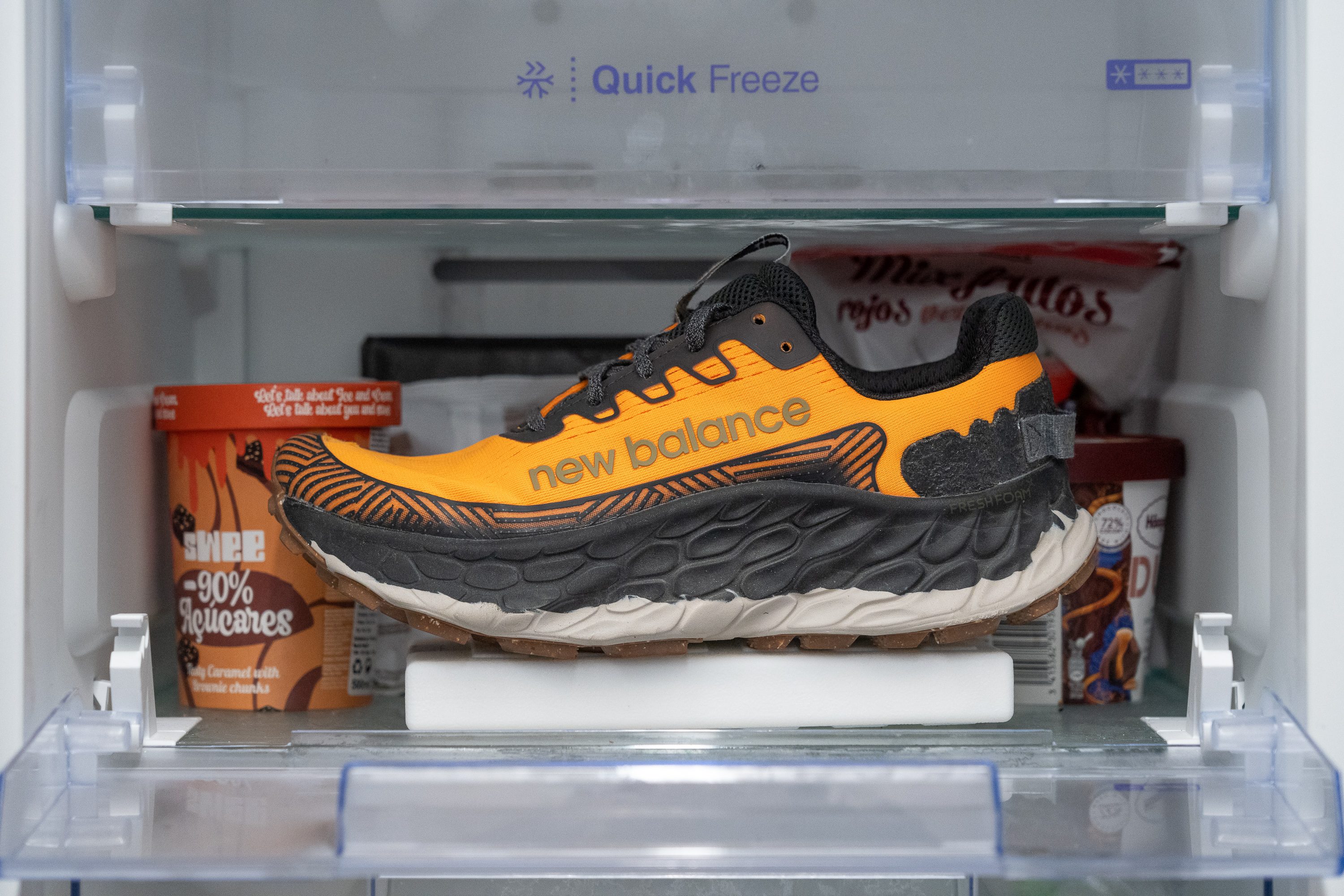
The FFX More Trail v3 has an 11.6% increase in stiffness and a 32.8% boost in firmness after spending 20 minutes chillin' in our freezer.
That's amazing for an EVA-based shoe. Indeed, the first number is absolutely mind-blowing and pretty close to the performance of the carbon-plated Saucony Endorphin Edge!
Won’t have you tumbling downhill
The shoe's cushioning is quite springy and ensures a comfortable run. However, its size and weight make it unsuitable for fast-paced activities. It performs best when used for easy, prolonged efforts.
For such a massively cushioned shoe, one would expect an annoying amount of tippiness—especially out on the trails. Surprisingly, though, the More Trail v3 is pretty darn stable.
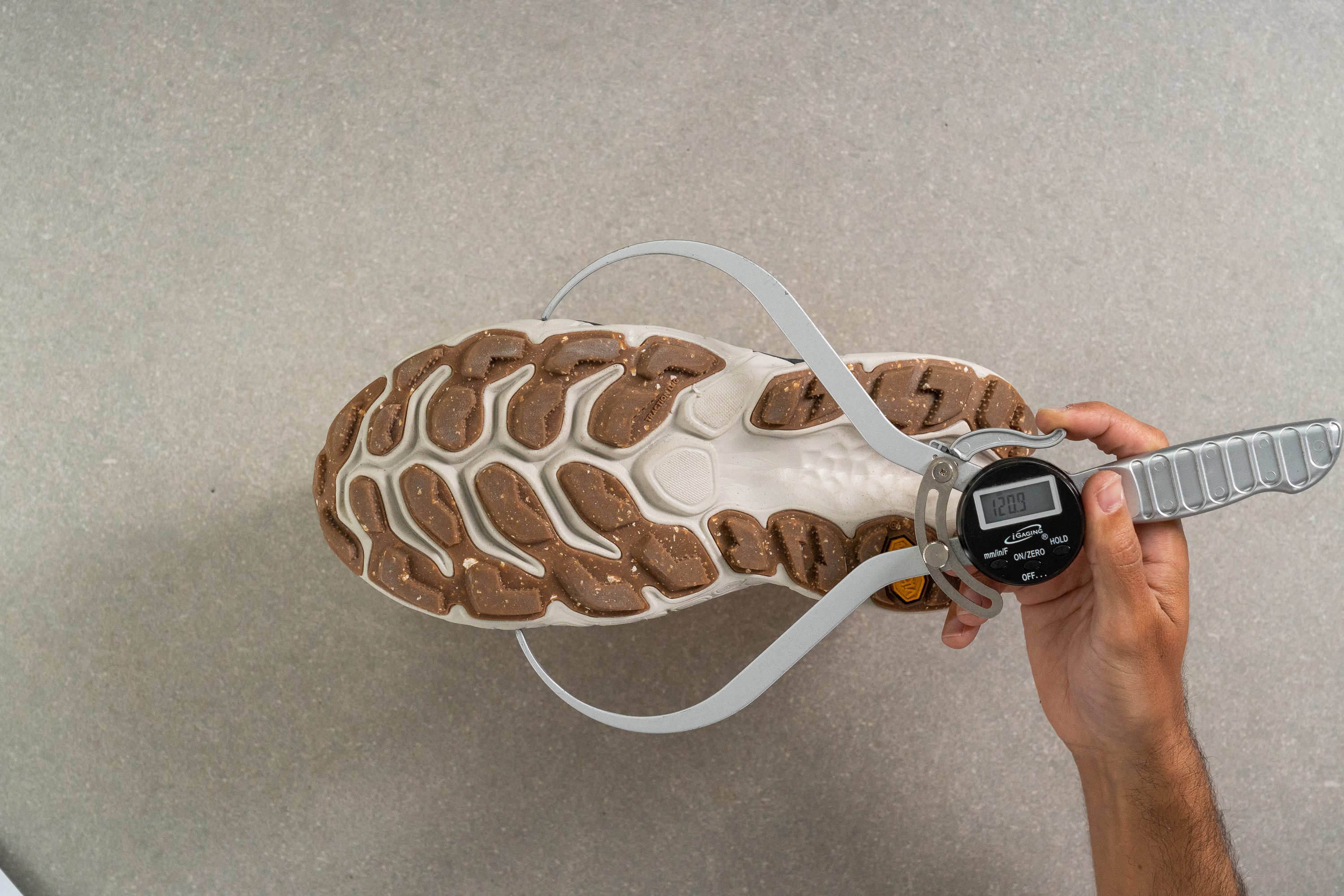
Due to a few factors, namely its high sidewalls and ridiculously wide base, you have to try really hard to roll your ankles in this shoe.
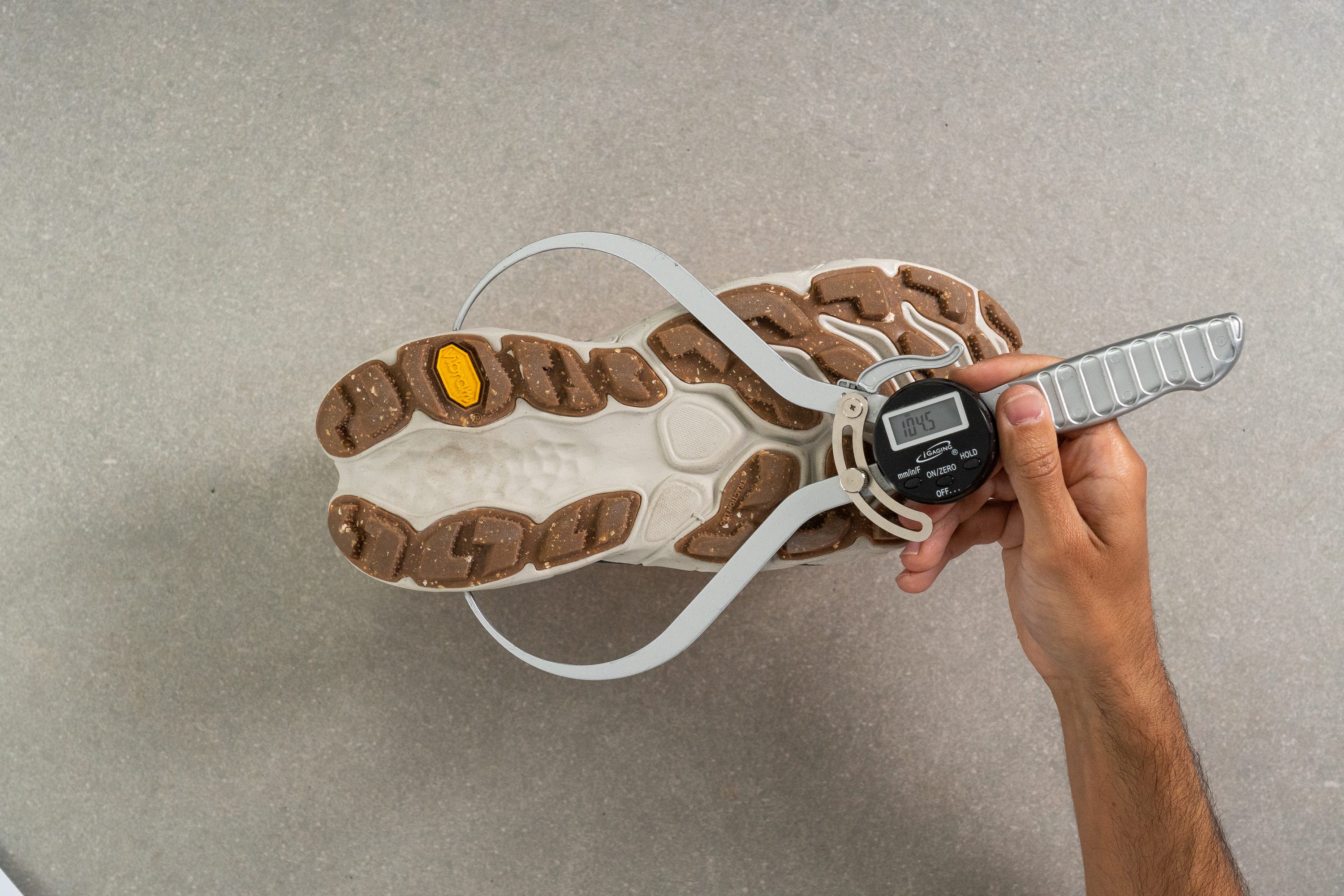
Yes, it's WIDE. Measuring 120.9 mm in the forefoot and 104.5 mm in the heel, it is one of the widest trail running shoes we've ever had in our lab, just below the Brooks Cascadia 16 and Hoka Stinson 7.
Finally, we were excited to find out how much of a rocker shape this shoe had.
Knowing that New Balance has been making super-curved, rockered shoes such as the SuperComp Trainer, we were expecting this one to have some rocker to it, even though it's a trail shoe. And that's exactly what we got—it's somewhere in between a flat and a rockered ride.
Heel stays in place
We liked the well-balanced design of the shoe's heel counter. There is some external build-up around it, but it’s still pretty flexible. And what's most important, it held our heels right in their place.
In our manual assessment, we rated the heel counter at 3/5, with the stiffest. That's exactly what it felt like during our wear tests.
Rubber is good enough, but not great
Surprisingly, we didn't find the regular MegaGrip outsole on the More Trail v3.
Taking its place is the new Ecostep rubber, which while sustainable (made from 30% recycled rubber), falls behind when it comes to traction on technical trails.
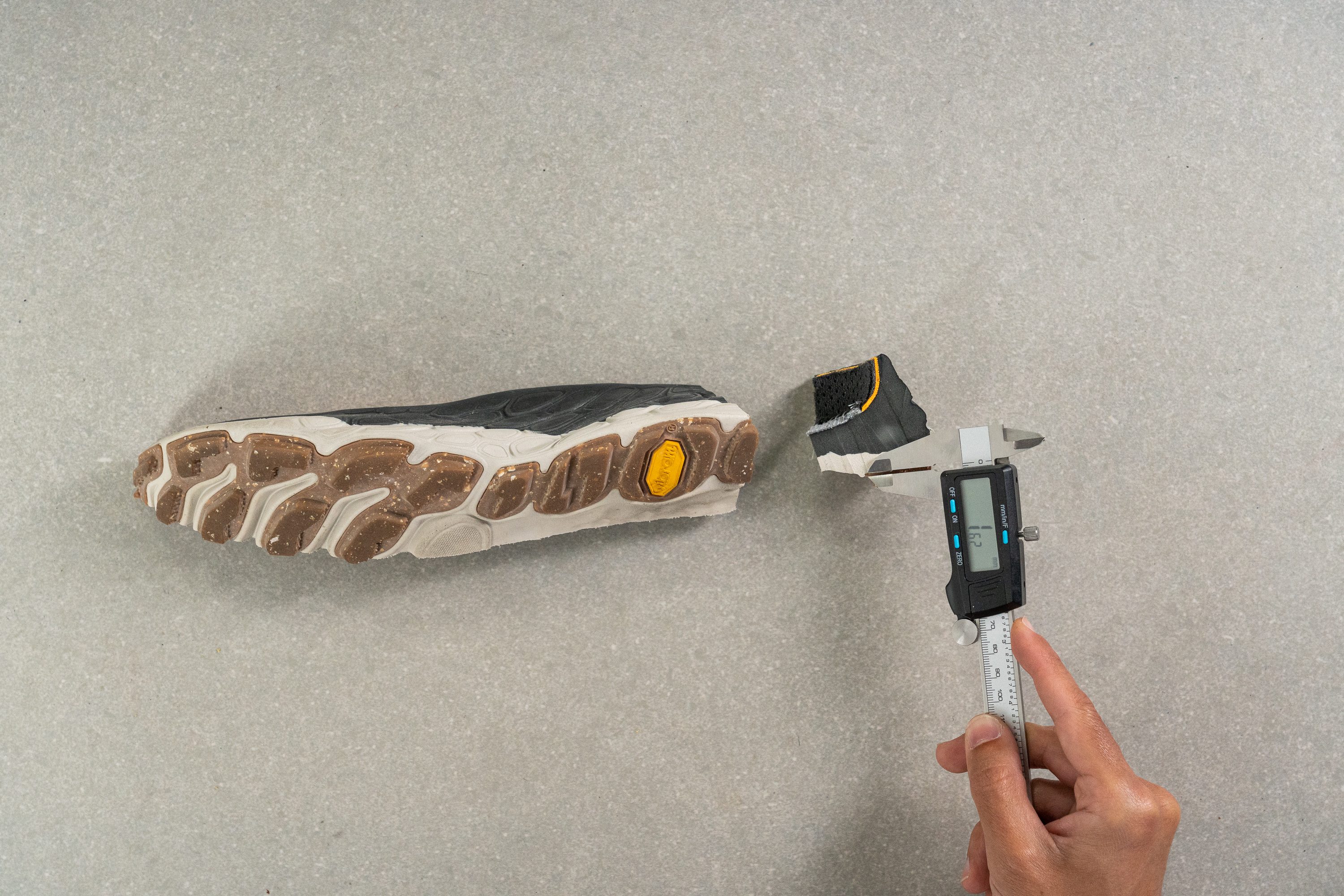
However, it's not all bad. Ecostep—combined with the shoe's toothy 5-mm lugs—still provided a good grip on soft dirt, single-track trails, mild mud, as well as roads.
It also appears to be a very abrasion-resistant rubber.
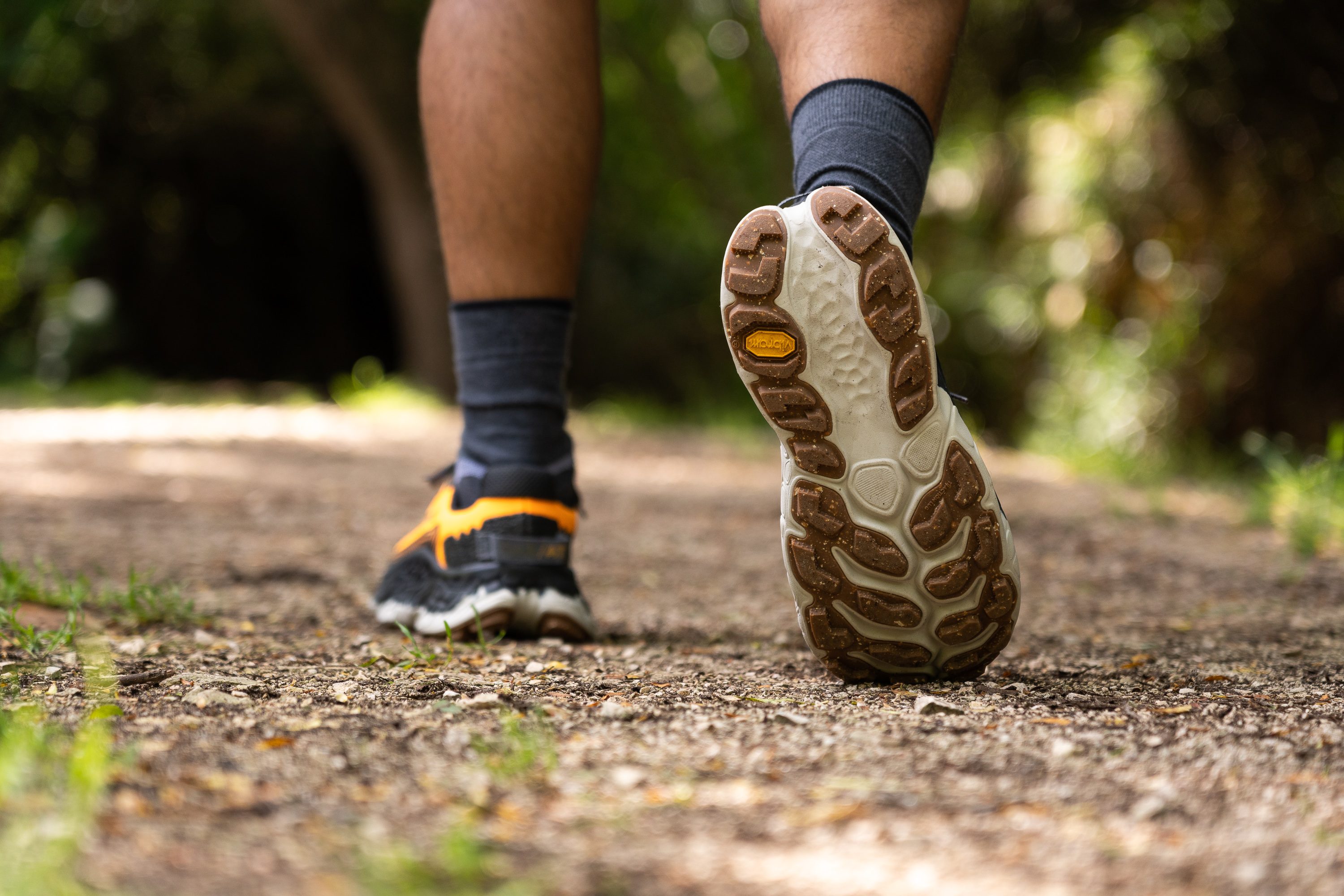
In our perspective, although it slightly enhances the shoe's performance in technical terrain, the trade-off is being positioned too high off the ground in any other scenario.
This shoe, more suitable for non-technical terrains, would benefit from smaller lugs similar to those found in the Hierro v7.
Lockdown is tricky
Because of the shoe's spacious midfoot, we had to really crank the laces down in order to get a good lockdown. On a positive note, the shoe’s fully gusseted tongue is wide and plush enough to guard against potential lace bite.
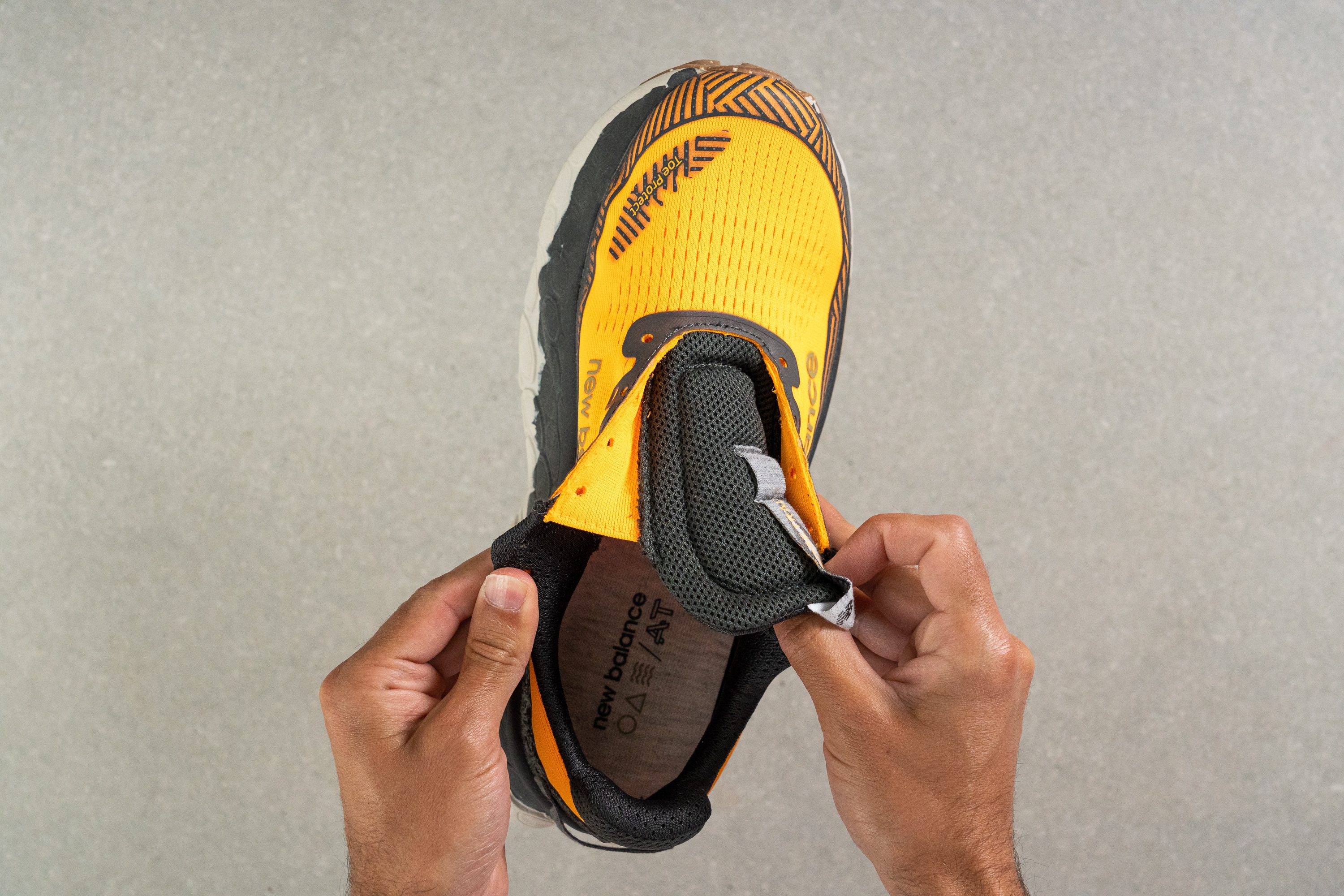
The fully gusseted tongue of the More Trail v3 boasts a generous 7.3 mm of soft padding, ensuring comfort during long trail runs.
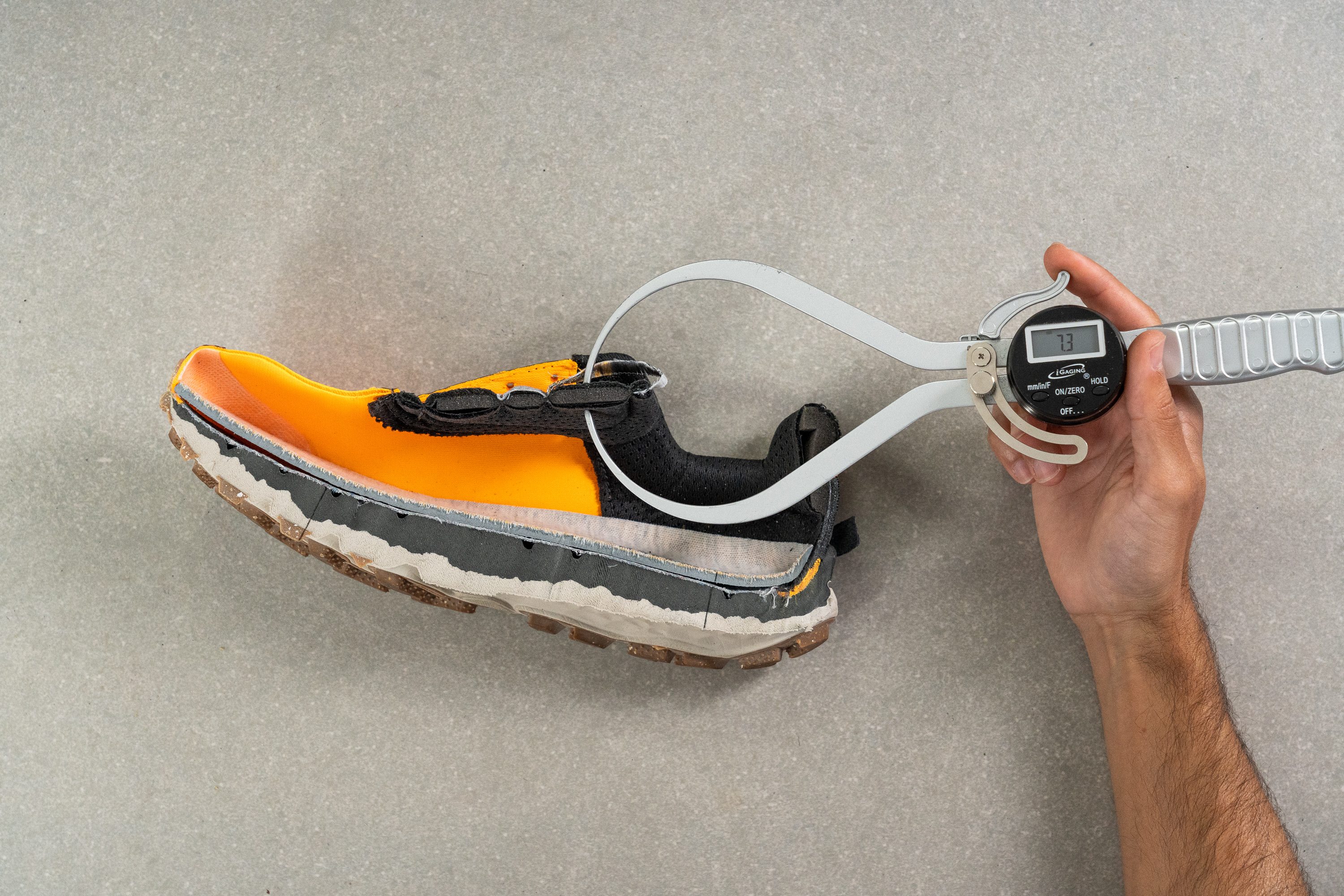
The laces are also on the positive side. They're made with a stretchy and durable fabric—and they look awesome!
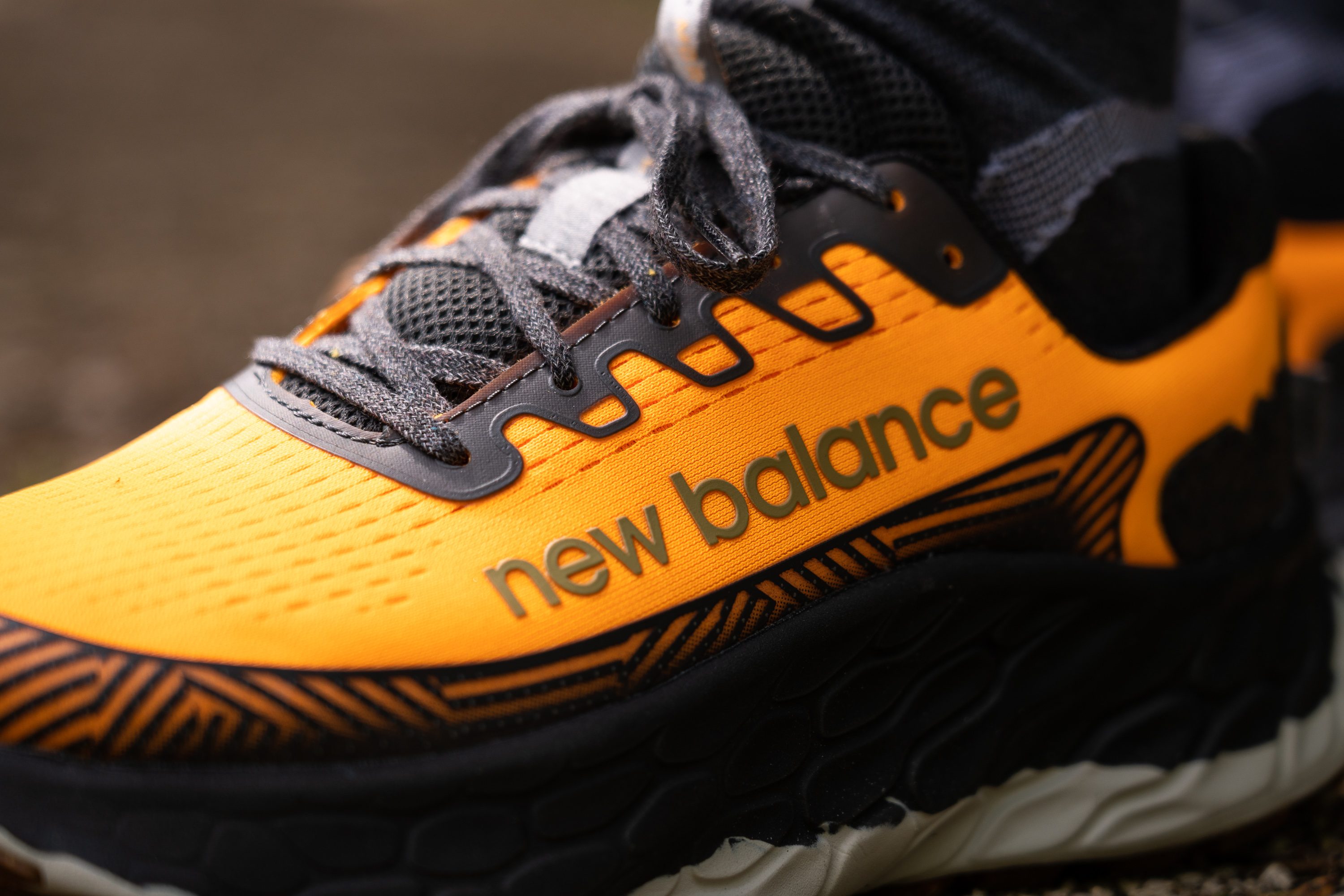
Two pull tabs, but one is a decoration
We just love pull tabs. They look amazing in most shoes and, above everything, they make it easy for us to slip into the shoe.
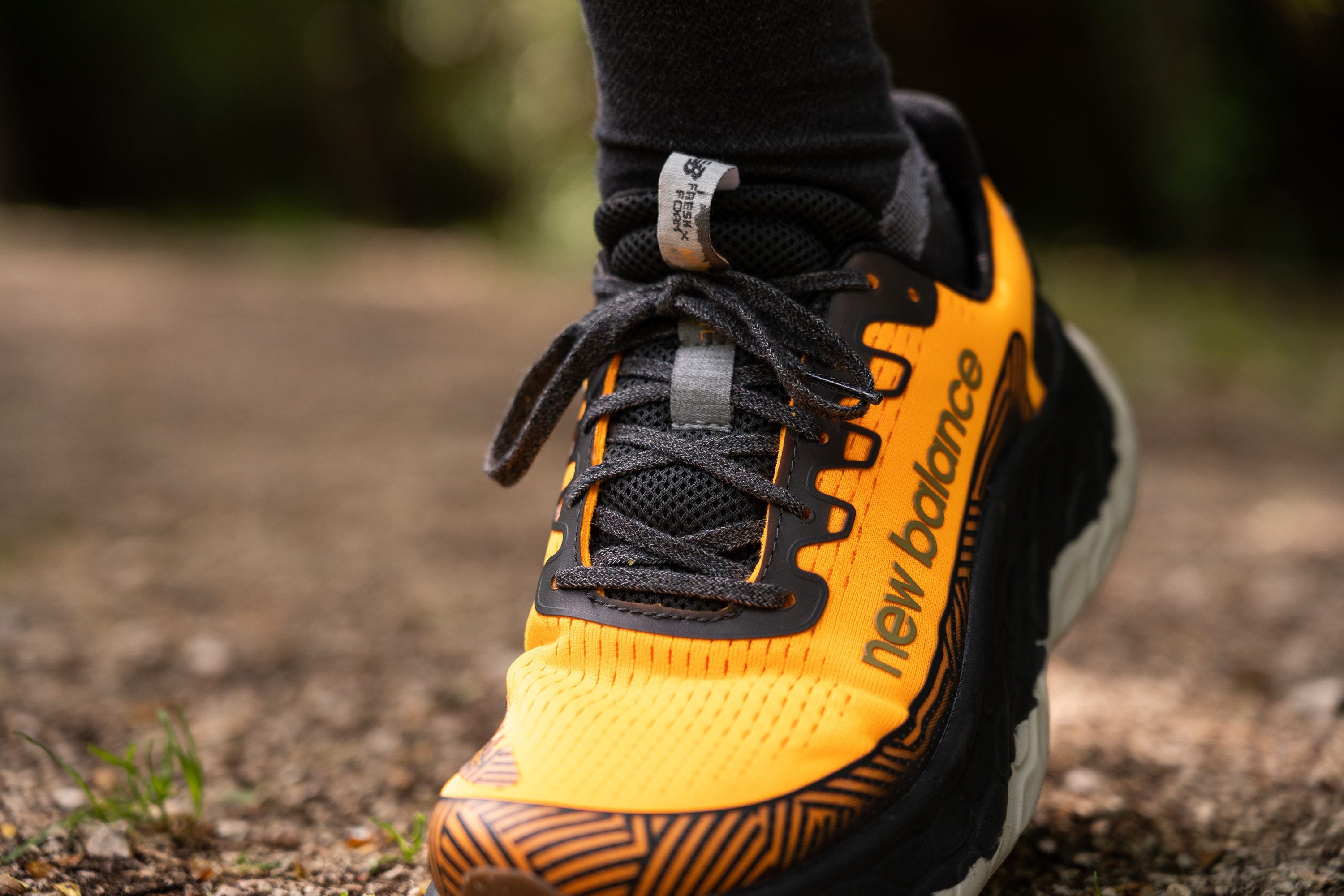
The More Trail v3 comes with two pull tabs: one on the tongue, which is very useful for adjusting the fit, and another on the heel, which does absolutely nothing because it's positioned too low. Hey, just cut & paste it for the v4!
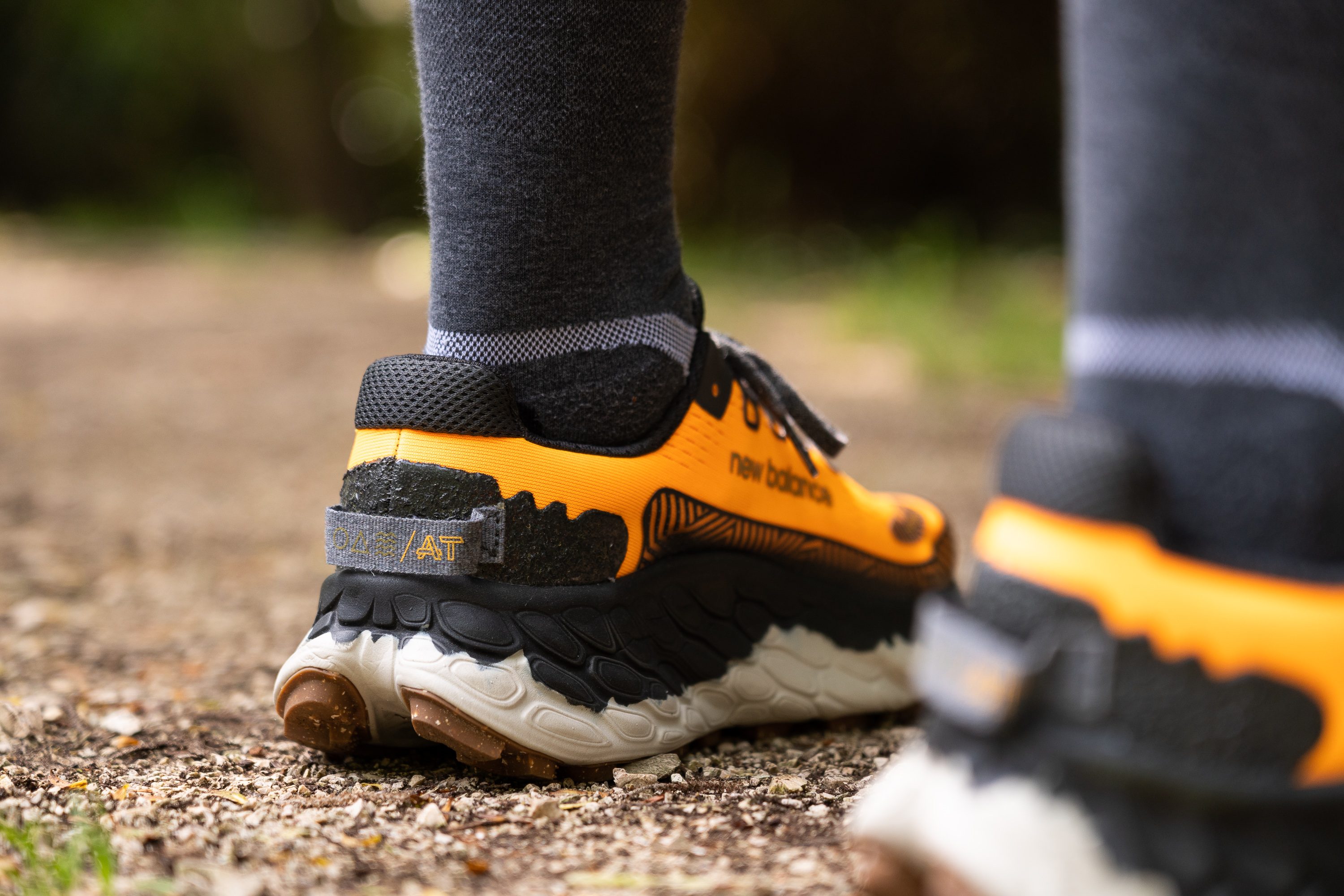
There’s more to the More Trail v3 than meets the eye
It is quite impressive that New Balance managed to keep the weight of the More Tral v3 down with all that foam! It is only a few grams heavier than average and noticeably runs lighter than it actually is!
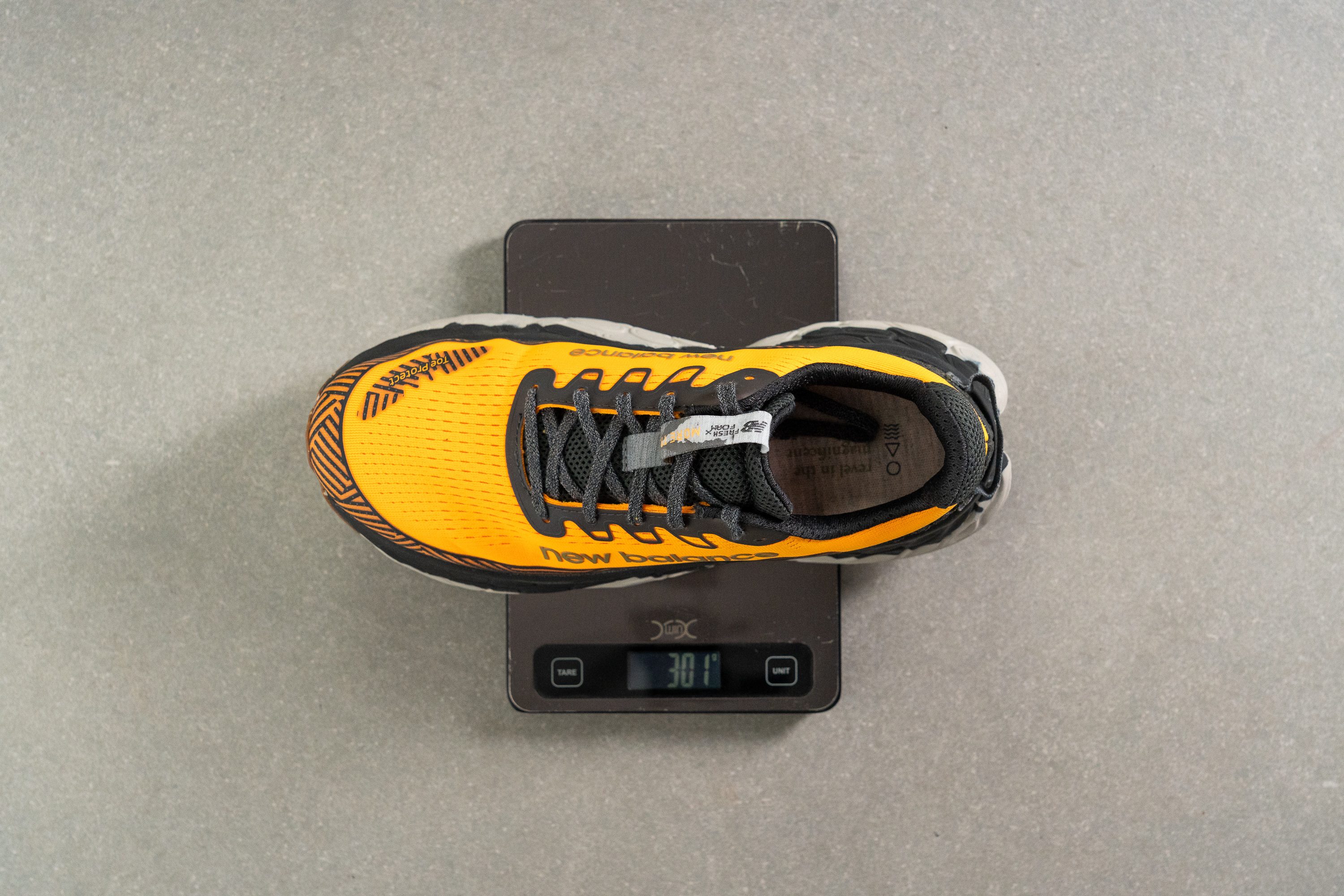
Moreover, its low drop, rockered geometry, and mild flexibility allow for smooth toe-offs and transitions and give the shoe a ride that’s reminiscent of its road-running cousin, the More v4.

